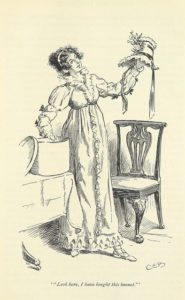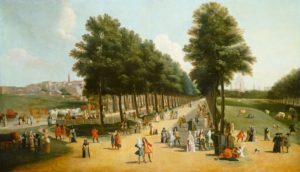I take a personal interest in this month’s theme of Sonnets and Bonnets, because as it happens I am the daughter and the wife of poets. My father, Paul Eaton Reeve, was a fairly well-known avant-garde Greenwich Village poet who did most of his writing and publishing in literary magazines in the 1930s and 1940s. My husband Peter Birchall is also a fine poet in a more classical style. I will share with you one short poem from each of them:

Paul Eaton Reeve
KEY POEM by Paul Eaton Reeve
If only one thing is right about a bird today
One wing that does not come off, one eye not pecked out in play
And corn only grows until the ears begin to shape
And then stops short
Or is bloodied down in acres
While over the field
The bird still flies on one wing, hops on one leg, eating the trampled ears.
And if only half the rain falls (on quiet faces)
And the other half is tears,
The withering earth would yield half-love for years.

Peter Birchall
THE VIEW FROM THE PORCH by Peter Birchall
His house was in the humble plains below
Majestic mountains, peaks which made him feel
Like to a laboring ant in some mean hive
That grubs along even as the eagle soars.
Life has one lesson – which is to forget:
He learned to walk eyes-down, came to accept
Brute drudgery as both his lot and due;
Yet when the alpenglow turned ancient glaciers
Into pink meadows floating in the sky,
He felt an exhaltation brought mute tears
Of longing and a loss – in later years,
He rarely ventured out after the sun set.
(Time is a healer, Beauty is a balm:
Commonplace thoughts, both fig-leaves, both dead-wrong.)

Not following in family footsteps, I am no poet at all, except for the odd bit of humorous doggerel. I remember years ago on the Janeites.com list, a serious academic-style debate was raging on the subject of whether Jane Austen might have been a man. To this I retorted:
If Jane Austen is a man
I am still her greatest fan.
If indeed a man she be,
She can always pleasure me.
Did Jane Austen wear a beard?
(This is getting very weird…)
Mercifully for posterity, that is all I remember of the poem, which I am sure you will agree is just as well. (I have also written some funny cat poems, but we will save them for another time, shall we.)
Moving away from my personal affiliations with the poetic art, suppose we resume the story I began here, and posted for Valentine’s Day. In it, Darcy and Elizabeth were seem beguiling away a rainy evening at Pemberley by reading poetry to each other. Here is the link: https://austenvariations.com/celebrating-valentines-day-at-pemberley/
Now let us pick up a few weeks later, and see how the Pemberley poetical pursuits are progressing, with the introduction of a certain…unwelcome character!

Lydia
Lydia’s Poem at Pemberley
Darcy had not precisely forbidden Lydia’s presence at Pemberley, although he strictly refused to countenance her husband’s. To be sure, there were a number of his wife’s relations whose company was a penance to him, but he bore with them patiently when at Longbourn, for Elizabeth’s sake, a kindness she esteemed with gratitude. Fortunately it was by no means necessary to issue invitations to Pemberley to the likes of Mrs. Phillips or Mr. Collins; but neither the simpering vulgarities of the former or the pompous prosings of the latter were nearly as hard to endure as Lydia’s noisiness, heedlessness, and be it said, distressing lack of any moral compass whatsoever.
It was not, therefore, an occurance Darcy could greet with anything other than a sinking of heart when Lydia appeared, racketing up the sweep in a carter’s wagon. Both Mr. and Mrs. Darcy were momentarily silenced by their loss to account for such a sight, but Lydia bounded out of the cart, and running up to them clutching nothing but a dusty carpet-bag, began noisily hailing them.
“Oh! I have surprised you, haven’t I! What a joke! I thought I would. But Wickham is off to London to play and try to win some money, we are in short street again you know, and have changed our lodgings, so he dropped me here on the way.”
“But that is Higgins’ cart,” said Mr. Darcy, bewildered, as well he might be.
“Oh! Is that the fellow’s name? I suppose you ought to give him a tip, Darcy. No more than a shilling or two, I am sure there is no need, but he was very good to pick me up. Wickham and I were in the mail coach, which passes five miles from here on the turnpike road you know, and I should have had to walk the whole way had this fellow not given me a ride.”
“You are very dusty, Lydia, come inside and we will clean you up,” observed Elizabeth quietly, hoping to separate her from her husband.
“Oh yes, and I can use some new clothes you know Lizzy. You must have some castaway gowns I can wear. I should like a silk. Only what a bother that you are so much littler than I am, I don’t think your gowns can be let down enough. Never mind, I could do with shawls, and pelisses, and especially undergarments – mine are so filthy.”
Darcy was mercifully spared exposure to Lydia during the ensuing bathing, trying-on of garments, and dressing that occurred before they met again at dinner, though he had much to endure with the spectacle of Lydia being excessively loud in her eating and in her rapturous exclamations over the food.
“Oh these quails! Do you eat such things every day? Lizzy you are so fortunate. And the dumplings in this chicken, so tender, I will have six, waiter,” she nodded at the serving-man with the dish. “The jellies! Who makes those? You never cared much for cooking. To be sure, Mama did not think it genteel to teach us much about it, but you were pretty much the worst cook of us all. Not that it matters now, does it, you must have fifty servants.” She swallowed down three dumplings in one gulp.
“Our housekeeper, Mrs. Reynolds, keeps the still-room and makes the jellies, she is quite an expert and enjoys it,” Elizabeth said moderately, hoping to repress Lydia’s enthusiasm and questions.
“Well they are perfectly top-hole. This quince pie, oh my!” cried Lydia, her mouth so full that crumbs fell out.
At last even Lydia was replete, and she lay back in her chair, the napkin tucked beneath her chin covered with strata of every thing she had eaten, and she did not manage to confine a belch. Elizabeth, mortified, could not even meet her husband’s eyes, which were likewise averted.
“Well! And now what shall we do?” demanded Lydia, pushing back her chair. “These long evenings at Pemberley are dull enough, I’ll warrant, for you are deep in the plaguey countryside, with nothing going on any where near you. I can’t think how you stand it, or why rich people should choose to live in such a way. No taverns, no theatres, no gaming-parlours within a day’s ride. You should have big house-parties all the time, to keep you entertained. But here are no visitors at all!”
“No,” agreed Darcy, “we have had a party lately, but they have all departed.” Both he and Elizabeth did not have to voice the obvious “Thank heavens that they were gone before you arrived.”
“We could play cards if they were still here, but three people are not enough for any good fun. I do like me a good big party with singing and dancing and eating and cards and lovemaking on the sly, and every such thing!”
“You will not find such here,” said Darcy dryly.
“Well, then, I will tell you what, after such a fine dinner, I should like some exercise. That long saloon hall thing outside the dining-room is in a state of high polish, that fancy wood must be a ripper to slide on. Can’t we get some big tin plates, Lizzy, you must have some in the kitchen, better than chamber pots, and plop ourselves down on them, and go sliding?”
“Elizabeth, you had better not,” said Darcy quickly. “Your condition…” and despite his discomposure he shot her a sudden, sweet and intimate look.
“Oh, are you in pig?” Lydia cried. “Well I’ll be! What do you know. I am in pig too! But that needn’t stop us from having fun.”
“Perhaps fun of a quieter sort,” said Elizabeth, repressively. “Darcy and I were going to adjourn to the library and read some poetry to each other. That is something we very much enjoy doing, and you might like to see the library, it is perhaps the most beautiful room at Pemberley.”
“Oh fie! Not me, that is Mary’s cup of tea. You know I never did care much for books. But, a grand room you say? Has it got soft chairs, and a big fireplace?”
“It does indeed,” nodded Darcy.
“And could we have a doze over some wine there?”
“We could have some Madeira if you like, and whether you sleep or not is at your discretion.”
“But I hope you will listen to some of the poetry too, Lydia,” said Elizabeth, rising.

The Library at Pemberley
Soon they were settled in the promised comfortable chairs, with the crystal decanter and tray of biscuits and cheese brought in by the servant and placed on a little inlaid table. Mr. Darcy started the reading with Cowper:
Ye fallen avenues! once more I mourn
Your fate unmerited, once more rejoice
That yet a remnant of your race survives. 340
How airy and how light the graceful arch,
Yet awful as the consecrated roof
Re-echoing pious anthems! while beneath
The chequer’d earth seems restless as a flood
Brush’d by the wind. So sportive is the light
Shot through the boughs, it dances as they dance,
Shadow and sunshine intermingling quick,
And dark’ning and enlight’ning, as the leaves
Play wanton, ev’ry moment, ev’ry spot.
But Lydia was asleep. She gave a loud snore, and Elizabeth leant over to snatch the goblet from her hand before it dropped.
“Lydia! Lydia, you were asleep.”
“Eh? What of it? Oh I am sorry – that poem made me think I was bedding down in the woods.”
Darcy had to smile. “That’s not a bad commentary. But perhaps, Lydia, you have a poem you like, or a favorite poet?”
She looked blank. “Well – not me, but to be sure Wickham has one, and he reads him to me sometimes in bed.”
“He does?” Darcy could not help exclaiming incredulously.
“Why yes. His name is – well, it begins with R. Are your poetry books in letter order? I could look among the Rs.”
“By all means,” Darcy replied, baffled, and Lydia hauled herself up and went over to the section indicated, while Darcy and Elizabeth exchanged glances of wonderment.
“Here ‘tis!” she exclaimed. “Now for some real poetry! Let me sit down and read it to you!”
“It is Lord Rochester,” murmured Darcy, seeing the volume.
“Yes, that’s him. A Ramble in St. James’s Park. Listen…oh, no, I’d better skip that first verse, it uses words you wouldn’t like. But this bit gives an idea of what people get up to in the park, though to be sure I hope Wickham doesn’t do any such things when he’s in London. It’s what happens beneath the trees you know, so that makes it a nature poem, and just up your alley:
Unto this all-sin-sheltering grove
Whores of the bulk and the alcove,
Great ladies, chambermaids, and drudges,
The ragpicker, and heiress trudges.
Carmen, divines, great lords, and tailors,
Prentices, poets, pimps, and jailers,
Footmen, fine fops do here arrive,
And here promiscuously they swive.
At this Elizabeth jumped up and snatched the book from Lydia’s hands with some energy. “Lydia! How could you. That is perfectly indecent. Be ashamed!”
Lydia stared at her, mouth agape. “Why, I don’t see why you should mind that. You are a married woman after all and know about such things.”
“But we do not talk about them in polite company,” said Lizzy through gritted teeth.
“Oh very well,” said Lydia, disgruntled. “I am sure I have no more wish to hear any more poetry. I’ll take a few more of those biscuits – does your cook make them? They are very good, that shortbread melts in your mouth.”
“I will tell her,” said Elizabeth. “And tomorrow – “ She looked inquiringly at her husband.
“Tomorrow we will have the coachman drive Lydia to the Bingleys’,” Darcy suggested smoothly. “It is only thirty miles, and you will be there by afternoon. I am sure you will be much happier there.”
“Yes I think I shall,” said Lydia brightening up. “Jane wears the same size dress as me.”

St James Park

12 comments
Skip to comment form
I have to admit that I’m not a lover of poetry and especially not Lydia’s choice!
She’s even worse than she was so good for Darcy with his idea to get rid of her! Although poor Jane and Bingley will no doubt suffer in silence. If they have any sense they will pack her off to her doting mother!
Glynis, remember how the Wickhams stayed with the Bingleys so long that even Bingley talked of giving them a hint? But they were too kind hearted, so I’m afraid they got stuck with them a lot!
Oh, Lydia, Lydia, Lydia! Nothing like sharing poetry to bring a family together, eh? 🙂
And speaking of sharing poetry, thank you for sharing your father and your husband’s poems! Each, in its own way, reminds me of “longing and loss,” to quote your husband’s poem; and yet, I also hear a kind of irony or wit in both poems, too? (I’m not adept at analyzing poetry, so forgive me if I’m way off the mark there!)
And last but not least, thank you for your delightful tale and the hilarious, bawdy start to your poem for the Janeite board!
Christina, thanks so much for your kind comments! I’m so pleased you liked my father’s and husband’s poems! Yes, I do indeed think there’s irony and wit in both. As for Lydia, though…I do think Jane Austen delighted in making her awful!
Oh-my-word! Lydia was horrid. She was unchecked, unguarded, and uncouth. Does she have any idea? No, I suppose not. That was an amazing excerpt. Well done. Thanks for sharing the poems of your family.
Thanks so very much for your kind words. Lydia has no self awareness, for sure, and as Austen said, her misery was considered certain!
Except we never see her misery. You might try describing that sometime, if you felt like turning your pen to “guilt and misery”!
Author
I’m sure I’ll get there someday, Dorothy, as fascinated as I am by Jane Austen’s most odious characters!
It’s said that Jane Seymour was fond of Quail whilst pregnant with Edward VI and often had them imported for her. Meals fit for a queen at Pemberley! I’m pretty sure Darcy is a better husband though.
Author
Is that so, Zoe, how fascinating – I never knew that! Yes, Darcy may have his arrogant moments, but no one would ever describe him as a Henry VIII! (grin)
Lydia never changes…shameful girl. I wonder what each of her parents would say to hearing that “poem”? I am not much for poetry and blame it on the fact that neither my parents nor my teachers read it to us. Shakespeare was the closest to something like that. Thanks for sharing.
Interesting question, Sheila, thanks for commenting. Let’s see. Lydia, with no money and a husband who’s bored with her, is passed around among her relatives. On a visit to Longbourn, she tells as a great joke the story of how she read Lord Rochester to Mr. and Mrs. Darcy. “Did you think that was an appropriate choice, Lydia?” Mr. Bennet could not help inquiring. “I cannot imagine what sort of reaction you elicited.” “Oh!” Lydia beamed. “Mr. Darcy did not say anything – he never does, so dull, I don’t know how Lizzy stands it. But she turned quite red and snatched the book out of my hand. It was so funny I split my gown laughing!” “She must have been mortified,” murmured Mr. Bennet to himself. “Mortified!” exclaimed Mrs. Bennet. “I do not know why you say that, Mr. Bennet, or how to account for Lizzy’s strange behavior. Lydia was always very clever, and only think of her knowing about books of poetry. I think it was very well done, Lydia, I do indeed, very well done.”